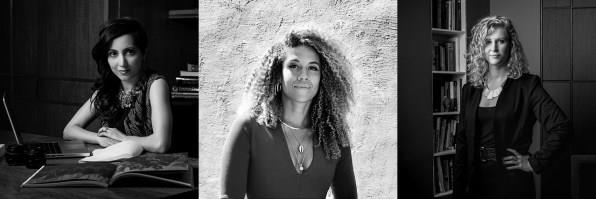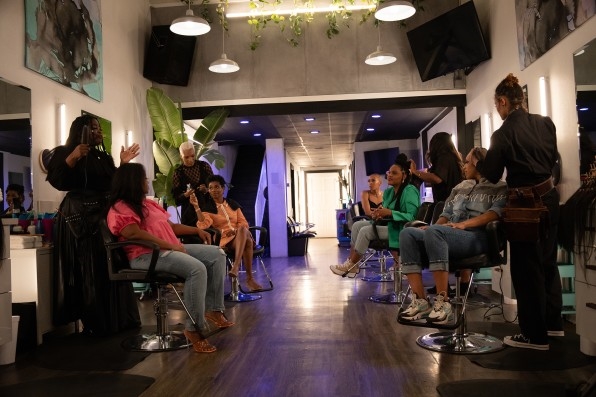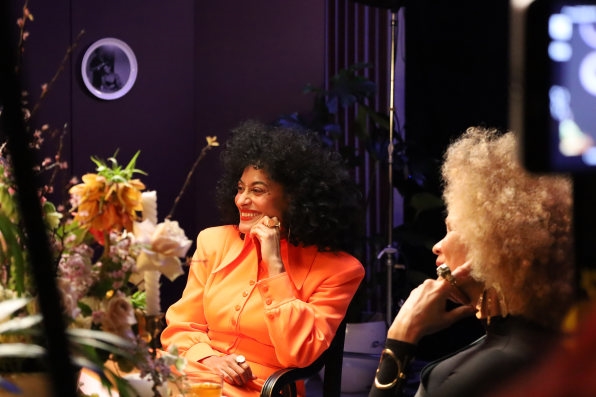How this production company is building a pipeline from Hollywood to political change
We know storytelling through film and TV can have direct impact on how audiences understand sociopolitical issues. But Culture House aims to create an even stronger bridge between Hollywood and effecting real world changes.

[Photos: Emily Winiker, Anthony Artis, and Emily Wikier]
Cofounded in 2018 by Carri Twigg, Raeshem Nijhon, and Nicole Galovski, Culture House is a production company at the intersection of pop culture and politics working across film, TV, and marketing. Recent projects include Brie Larson’s Disney+ docuseries Growing Up following the lives of 10 young adults sharing their experiences of adolescence; and dropping this month is Hulu’s The Hair Tales, an exploration of Black women’s hair journeys, from how their hair is policed to the importance of hair in their personal development.
In addition to its own slate of projects, Culture House has also built a consultancy division to work with other entertainment companies on infusing their work with a more nuanced cultural lens. Culture House is also exploring live events as a way to give in-person touchpoint to their film and TV projects.
“[We’re] really trying to build up the vision for our company as a production company, but also a multifaceted media company,” Nijhon says.
Culture House’s multifaceted point of view parallels the multifaceted backgrounds of its cofounders with Nijhon having worked in TV and film, Galovski in the NGO space, and Twigg being a part of President Barack Obama’s public affairs team.
“It’s not a coincidence that so many of us left the Obama era and went into storytelling,” Twigg says. “We’re all people who are animated by the idea that society can and should change. We thought the place that you do that are the halls of government. [But] you realize you actually need a cultural foundation in order to legislate off of. And if your cultural foundation won’t support ideas, like meaningful climate policy or gun rights or marriage equality or women’s choice, then you have to build that culture first.”
Culture House’s cofounders break down the larger conversation The Hair Tales is meant spark, how they’re holding Hollywood accountable to its DEI promises, and where they’re expanding to next.
The Hair Tales is executive produced by Oprah Winfrey, Tracee Ellis Ross, Michaela Angela Davis, and Tara Duncan. That’s major star power. How did this project come together?
Twigg: It was such a project that fits squarely into the Culture House ethos of what we want to be working on and what we want to see in something that hadn’t gotten its due on TV. [We wanted] to visually represent and, in a cultural way, codify the intersection that Michaela and Tracee in particular really represent, which is that for Black women, in our hair there is culture. There’s history. There’s artistry. It’s such a multifaceted thing. Tracee really gave us our thesis for the series, which is that for many Black women, you can track their journey of self-acceptance alongside their journey with their hair. Our hair is this external manifestation of so much of what’s going on with our interior lives. What’s going on with who we want to be, or who we’ve been before. All of that we can talk about in the context of our hair. It really gave us the foundation that we’re able to build in the series.
In one episode, Representative Ayanna Pressley speaks about the CROWN Act which recently passed the House. How do you collaborate with those in DC so that these projects you put out don’t fall on deaf ears?
Twigg: We were lucky enough to be choosing from the likes of some of the most sought after and well known artists, entertainers, and activists of the day. So we were really specific and clear about wanting to have Representative Presley not only because of her personal story, and wanting that representation around alopecia, but also because of the ways in which our hair is very directly politicized and our bodies are very directly politicized. Having someone from within the context of that system was really important to us. We are really at a moment in time where our pop culture is creating our politics downstream. We’re a production company, but we’re giving [politicians] proof points that they can point to.

After the George Floyd protests in 2020, there was a lot of discussion across industries to address diversity and racism. That led to Culture House creating a consultancy division to address cultural bias in Hollywood. How are you ensuring people keep up the momentum gained two years ago?
Nijhon: The same way that marketers are starting to say, ‘diversity is not a strategy. Diversity is general marketing. That’s just what it should be. That’s what we are looking to do and what Culture House represents. The consultancy for us is a way to be part of that conversation because it expands our influence tremendously. There are only so many things you can produce end-to-end. But the work we can do as consultants is really enormous.
Have you given any thought to expanding your current work?
Nijhon: Absolutely. We built our business on our premium doc series and unscripted series, but we already started building our scripted division. We’re also looking to build out experiences. Coming out of a pandemic, we need more touch points where we’re actually engaging with each other. Mental health is a big piece of the conversations that we have in our shows and our work, as you can see in Growing Up and even Hair Tales. How do we now start to translate that into bigger experiences that bring in additional partners and different strategic ways to reach communities beyond just the work that we do in television and film?

What kind of change do you hope to see implemented in the next five years as you continue the work that you do?
Galovski: My answer to that is just to continue to be able to tell incredible stories of what it means to be human right now and for so long it’s been one type of story. And now I’m just hoping that the change that we bring about is how beautiful every type of story is and allowing so many different types of stories to be told.
Twigg: We have a phenomenal, profound deep impact on how this country actually functions, whether for the good or for bad. I see a lot of hand washing like, ‘we’re just entertainment. We’re not that powerful.’ And I think it’s BS. We actually are that powerful and the more we run away from that, the more F’d we are.
Nijhon: I like to see people own their power and their responsibility. And that doesn’t need to be at the cost of great art. The idea is to be cognizant of the influence that you have and use it in a way that feels productive and for us. That’s what we want to continue to do: make work that feels culturally productive.
(26)


